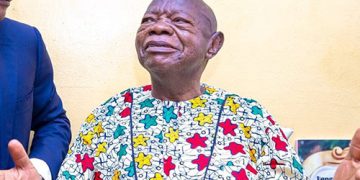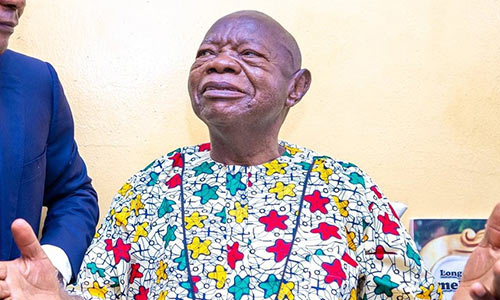Renowned highlife artist and folklorist, Mike Ejeagha, has passed away at the age of 95 following a long struggle with prostate cancer.
Drivetvnews gathered that the iconic Igbo musician died on Friday evening at the 32 Garrison Hospital in Enugu.
His passing was confirmed by his first son, Emma Ejeagha, during a phone interview with Vanguard on Saturday.
“Papa died exactly at 8 p.m. on Friday. His body has been moved to the morgue. I was with him in his final moments. I’ll inform the rest of the family in the morning,” Emma shared.
He also revealed that his father had prepared the family ahead of time, expressing a wish that his body not be embalmed or kept in the mortuary for long.
Describing his father as a peace-loving man and a musical genius, Emma noted that Ejeagha had been managing prostate cancer since 2006, enduring several hospital stays over the years. Although his condition briefly improved and he was discharged, he was readmitted last Tuesday after a sudden relapse and passed away shortly afterward.
Mike Ejeagha was a defining figure in Nigerian highlife music, especially prominent during the 1980s. Celebrated for his narrative style, he fused traditional Igbo folklore with music, using proverbs and moral lessons to create deeply meaningful songs that resonated across generations in Eastern Nigeria.
Over a career that spanned more than 60 years, Ejeagha became known as a pioneer of indigenous Igbo musical storytelling.
In 2024, his work gained renewed attention when his 1983 hit, Ka Esi Le Onye Isi Oche, featured in a viral comedy skit by popular comedian Chukwuebuka Emmanuel Amuzie, known as Brain Jotter. The skit sparked a global dance trend, reintroducing Ejeagha’s music to a younger audience and earning widespread praise.
This resurgence brought public attention to his contributions, including visits to his Enugu home, the release of overdue royalty payments, and a tribute from the Enugu State Government, which named a road after him in honor of his legacy.
Mike Ejeagha will be remembered not only as a gifted musician but also as a guardian of Igbo oral heritage. His music, rich in cultural wisdom and values, remains influential across generations.















